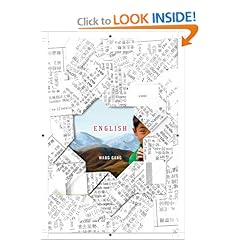
The Rape of Nanking by Iris Chang is pretty much the only book about 20th century Chinese history that I've heard of, because it's been popularized in Western culture. My friend Jenny also recommended it to me as one of her favourite books, so I intended to read it eventually but never got around to it. The book is a history of the Japanese occupation of Nanjing (then the capital of China) from 1937-1938 during WWII and the Sino-Japanese War. I don't know how helpful the book would be for my research, but I know that my grandmother was affected by the war and Nanjing was not far away from her hometown, so this may be a good place to begin.

English by Wang Gang is a novel translated into English about the protagonist's experience growing up in Xinjiang during the Cultural revolution. This is the only novel about Xinjiang written in English that I know of after Far West China blogged about it, but maybe I just haven't looked hard enough. I'm vaguely skeptical of this novel, but since material about Xinjiang is so rare, it might spark some ideas and be helpful.
China Witness by Xinran also seems to be an interesting read. The author travelled around China to interview men and women who have survived the Cultural Revolution, including political prisoners, an acrobat, and a teahouse news singer (According to the library catalogue - what does that even mean?). And there's a chapter called "New discoveries in Xinjiang, the World's Biggest Prison." Sounds fascinating (especially since people who write about China tend to forget about Xinjiang).
I have to include a disclaimer that though I'm excited about reading new materials about Chinese history, I'm skeptical of the books I listed, which may be part of a certain narrative about the east. Chinese history translated into popular Western nonfiction is often sensationalized and exoticized. (i.e. foreign culture with fascinating, strange traditions, oppressive communist, conformist government, backward, third-world, primitive cultures etc etc) Of course I'm not saying that Chinese history and society isn't inherently oppressive and shouldn't be criticized, but I believe we should be critical of a particular narrative concerning "the Third World" that the West perpetuates in popular culture and scholarship. This discourse often implies that "Third World" citizens have no agency and must be rescued from their oppression, by either escaping their conditions and immigrating to a better place, or by some sort of Western interventionist rescue. As a result, the people represented are seen as "objects" of oppression rather than "subjects."
My articulation of this critique of historical narrative and representation is still vague. But throughout this process, I hope to be thinking about these questions. In writing about those who have been left out from history, how do we represent an accurate portrayal of the east without sinking into the dominant, established narratives that disempower certain people? How do we examine and critique social oppression in the "Third World" without adopting Eurocentric superiority or falling into cultural relativism? In my storytelling, how do I craft an alternative narrative of liberation, rather than a narrative that is a part of the dominant culture?
A note on blogging: since I haven't blogged in so long, I'm amazed by how much things have changed since I used livejournal so many years ago. Back then we actually memorized the HTML tags for everything! Now it's just all incorporated into the posting options to make things simpler. o_O And I've forgotten all my HTML tags so I have to actually use the automatic options!
I should stop here for now and work on my IIPP application. The deadline is so soon! Hopefully I"ll have better luck with the library being open tomorrow.
No comments:
Post a Comment